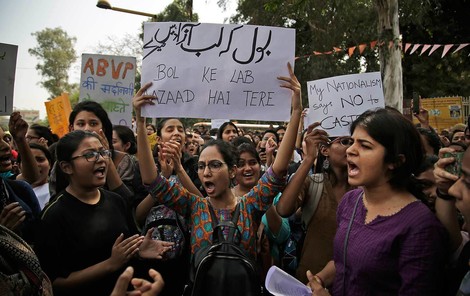Your podcast discovery platform
Curious minds select the most fascinating podcasts from around the world. Discover hand-piqd audio recommendations on your favorite topics.

piqer for: Climate and Environment Globalization and politics
Raksha Kumar is a multimedia journalist focusing on human rights, politics and social injustices. Since 2011, she has reported for The New York Times, BBC, Guardian, TIME, South China Morning Post, Foreign Policy, Scroll.in and The Hindu.
In March 2018, she was awarded the National Foundation for India Media Award for her reportage on land rights in India. In 2017, she was shortlisted for Kurt Schork Memorial Awards in International Journalism. For her work on land conflicts in India, she was awarded the Chameli Devi Award for Outstanding Media Personality in 2016.
As a reporter, her focus areas are land and forest rights of the most vulnerable communities. However, since these issues cannot be looked at in isolation, Raksha found herself increasingly reporting on armed conflict around resource extraction in places like Chhattisgarh and Kashmir.
In 2015, she wrote, shot and directed a documentary film on Rationalists in Contemporary India. It was aired by India's public broadcaster, Doordarshan. The film has been screened in 29 locations across the country until now.
The same year, Raksha was selected as a Chevening Fellow by the University of Westminster to research on Hindu Right in the UK. This helped Raksha build on her post graduate dissertation which was on Hindu Fundamentalists in India.
With a Fulbright Scholarship for Leadership Development, she went to the Columbia University in New York City to pursue a Masters in Science. As a student, she was offered the Scripps Howard Fellowship to report from Israel and the West Bank. Since 2011, Raksha has reported from 11 countries across the world.
Raksha worked as an editor at NDTV, leading English news channel in India. She was the editorial head of a two-hour prime time news show, where she lead a team of about 20 junior journalists.
A graduate of Lady Shri Ram College in New Delhi, Raksha was a dedicated student and a passionate public speaker.
India’s ‘Annihilation’ Of The Resistance: No Room For Dissent In The World's Largest Democracy
The Indian State accused a wheelchair-bound English professor of Delhi University, an undergraduate student, a journalist, and three members of India’s indigenous communities of conspiring to wage war against India.
The English professor, G. N. Saibaba, is a paraplegic and 90% disabled. The government claimed they were a part of the Maoists—extreme left wing guerrillas who use weapons to fight government policies which go against the indigenous populations.
For over three decades, the Maoists – thus called because of their membership in the Communist Party of India, – have opposed mining, fought for the rights of forest dwelling communities and kept the central Indian forest region from "modernising".
The Communist Party of India is banned in the country because of its espousal of violence. Therefore, its members can be persecuted in a court of law. The five people were allegedly Maoists.
However, Prof. Saibaba was granted bail owing to health reasons. But the Indian government seems to have arrested him again and put him behind bars for life.
This story documents Prof. Saibaba's life and his court case, and goes on to talk about how the Indian state is criminalising dissent.
Having delivered lectures across India and at universities in the United States and Brazil, Saibaba had become an internationally renowned activist against discrimination and caste-based oppression and for progressive causes including women’s rights.
Saibaba’s defenders say the arrests were meant to send a chilling message to anyone who might criticize the government.
Stay up to date – with a newsletter from your channel on Globalization and politics.
